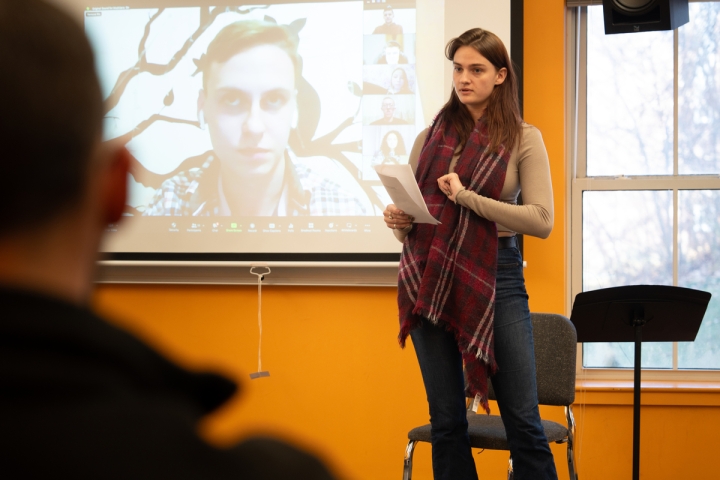Dartmouth’s first-ever Ukrainian language and culture class finished the fall term last week with a presentation of poems, stories, and songs in the Ukrainian language and in translation.
The works were shared by Dartmouth students and their student collaborators from Ternopil National Technical University, who participated via Zoom from Ternopil in western Ukraine.
Associate Professor Victoria Somoff says the collaboration with students from Ternopil, who were paired with the students in her Fall ’23 Intensive Ukrainian class, was meaningful for all the students.
“In Ternopil they were so eager and excited for this collaboration. To know that somewhere in America there are people who care about Ukraine and care enough to actually learn their language,” Somoff says. “So they did so much work for this class. They did conversational practice, they did tutoring, they created flashcards for them. They did language learning videos. They were willing to spend just hours working with us.”
The excitement was mutual, Somoff says, “The students in my class were surprised and pleased to discover that their peers in wartime Ukraine are eager to spend hours helping them master Ukrainian.”
Evan Bork ’26, grew up in Cleveland and heard Ukrainian at home spoken by his mother and grandparents, who are from Ukraine. He has always wanted to learn to read and write the language, but was disappointed when he found out Dartmouth, at the time, did not offer Ukrainian language classes.
“When I was going through the college admissions process, I knew Ukrainian wasn’t offered here,” Bork says. “I love Dartmouth and I’m so I’m glad that we have it here now. I was very proud that I could be a part of the first group that gets us started at Dartmouth.”

Bork said working with his partners in Ternopil was a tremendous experience. He talks about trading jokes and memes and hanging out like normal students—until it wasn’t normal.
“I was texting one of my partners, sort of late at night for them, and I’m like, why aren’t you sleeping? And then they sent me a screenshot of where in Ukraine the air raid sirens were going off, and their whole region was just constant sirens. But they were still studying, they’re still trying to enjoy life. Life’s got to carry on even though the war’s going on.”
The event on Thursday, a “Student WarShop on Ukraine: Words, Music, Film, History,” was a celebration of the completion of Dartmouth’s first Ukrainian language intensive.
And it also involved presentations by members of the Dartmouth Student Alliance for Ukraine on Ukrainian history, culture, and activism and final poetry, prose, and song translation projects by the fall 2023 Intensive Ukrainian students and their partners in Ternopil.
Larson Kaidel, a PhD student at Thayer School of Engineering, at first wanted to sit in on the class because a good friend is serving in a military unit in Ukraine. Somoff convinced her to enroll, and Kaidel says she’s very glad she did.
“I wanted to feel more connected to my friend who was fighting and take more of an active role in preserving the culture and spreading the culture of Ukraine through language and studying the culture,” Kaidel says.
In her welcome at the start of the program, Somoff—who is from Donetsk in eastern Ukraine, which has been occupied by Russia since 2014—thanked “these seven brave students” who are the first to take Ukrainian at Dartmouth.

“As a language instructor, and even more so as a native Ukrainian, I am truly grateful to them for choosing to study a language that has never been offered here before, a language that is beautiful but not easy, and finally for not being scared away by the word ‘Intensive’ in Intensive Ukrainian,” Somoff said.
Professor Lesia Nazarevych, who led the students of Ternopil National Technical University in the class, also shared words of thanks via Zoom at the event.
“Dear Professor Victoria, thank you for your invitation to join this project. Thank you, dear American students. You chose to study Ukrainian and this way, you supported Ukraine in its struggle for freedom, identity, and independence. Best friends make hard times easier,” Nazarevych said.
The intensive class was the equivalent of Ukrainian language classes 1 and 2. Somoff is offering Ukrainian 3 in winter term, which six of her current students plan to take, she says.
“It is really my hope that we can go even beyond that, that we can build the second year of Ukrainian and then can add perhaps a Ukrainian minor, and maybe some kind of summer program abroad,” she says. “Not in Ukraine at this point, but there are programs in Canada where students can go for immersive experience with teachers from Ukraine at some Canadian schools. So it’s not going to stop.”
Somoff offered her thanks to the Leslie Center for the Humanities for supporting the class through a Lab Course Development Grant, and to the Department of Music for supporting the performance.
